小学英语六年级句型练习题
小学六年级人教PEP版上学期英语句型转换专项易考题
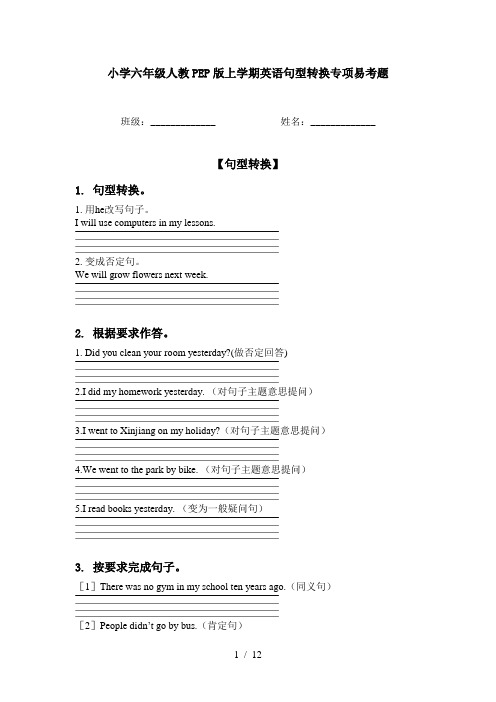
小学六年级人教PEP版上学期英语句型转换专项易考题班级:_____________ 姓名:_____________【句型转换】1. 句型转换。
1. 用he改写句子。
I will use computers in my lessons.2. 变成否定句。
We will grow flowers next week.2. 根据要求作答。
1. Did you clean your room yesterday?(做否定回答)2.I did my homework yesterday. (对句子主题意思提问)3.I went to Xinjiang on my holiday?(对句子主题意思提问)4.We went to the park by bike. (对句子主题意思提问)5.I read books yesterday. (变为一般疑问句)3. 按要求完成句子。
[1]There was no gym in my school ten years ago.(同义句)[2]People didn’t go by bus.(肯定句)[3]Was there a small building in your school?(否定回答)[4]didn’t library We have a(连词成句)[5]up Internet looked I it the on(连词成句)4. 句型转换。
[1]What does she do at weekends?(用sometimes / have dancing lessons)She ________ ________ dancing lessons.[2]I have to get to school before 10 o’clock.(对句子主题意思提问)________ do you ________ to get to school?[3]We sometimes do the housework for the old people.(改为—般疑问句)[4]Is it grape juice?(否定回答)[5]We went there by plane.(就主题意思提问)5. 按要求改写句子。
PEP小学六年级英语上册重点句型练习
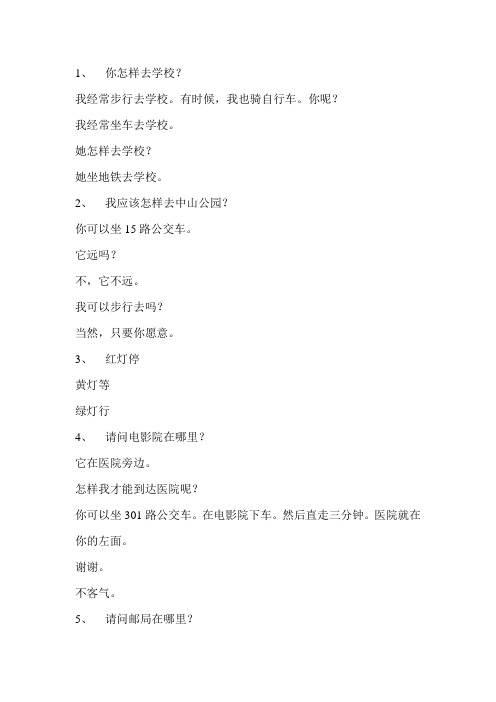
1、你怎样去学校?
我经常步行去学校。
有时候,我也骑自行车。
你呢?
我经常坐车去学校。
她怎样去学校?
她坐地铁去学校。
2、我应该怎样去中山公园?
你可以坐15路公交车。
它远吗?
不,它不远。
我可以步行去吗?
当然,只要你愿意。
3、红灯停
黄灯等
绿灯行
4、请问电影院在哪里?
它在医院旁边。
怎样我才能到达医院呢?
你可以坐301路公交车。
在电影院下车。
然后直走三分钟。
医院就在你的左面。
谢谢。
不客气。
5、请问邮局在哪里?
它在电影院的东面。
然后呢?
在电影院左转,然后直走。
它就在你的左面。
6、直走
向左转
向右转
直走五分钟,然后左转,学校就在你的右边。
7、周末你将做什么?
这个周末,我将去探望我的祖父母。
今天下午你将去哪里?
我将去书店。
你要去买什么?
我将去买一本漫画书。
你几点去?
我将在3点去。
8、明天我要去打篮球。
这个周末,我们将去植树。
周六,他将要去书店。
今天放学后,他们将去庆祝圣诞节。
9、今天放学后,你要去做什么呢?
周末你将要做什么呢?
明天你将要去买漫画书吗?
寒假你将要去滑冰吗?
10、你的爱好是什么呢?
我喜欢骑车(开车,拉小提琴,集邮,做风筝)
11、他的爱好是什么?
他爱好运动。
他们的爱好是什么?
他们喜欢拉小提琴。
人教版小学六年级上英语句型训练习题(有答案)
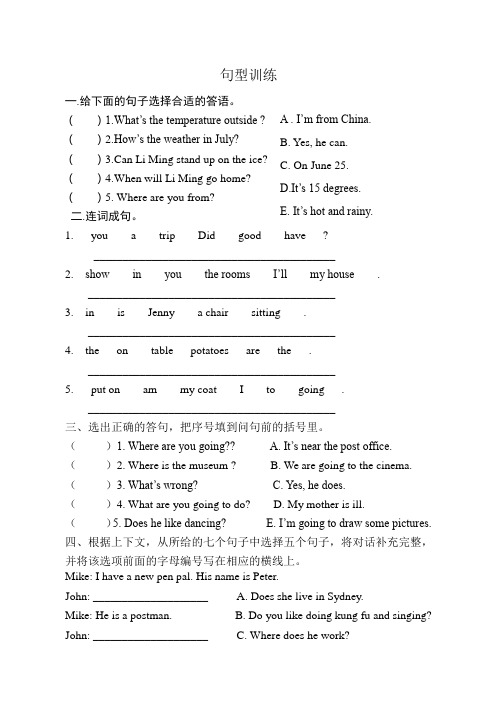
A . I’m from China. B. Yes, he can. C. On June 25. D.It’s 15 degrees. E. It’s hot and rainy. 句型训练一.给下面的句子选择合适的答语。
( )1.What’s the temperature outside ?( )2.How’s the weather in July?( )3.Can Li Ming stand up on the ice? ( )4.When will Li Ming go home? ( )5. Where are you from?二.连词成句。
1. you a trip Did good have ?__________________________________________2. show in you the rooms I’ll my house . ___________________________________________3. in is Jenny a chair sitting .___________________________________________4. the on table potatoes are the .___________________________________________5. put on am my coat I to going .___________________________________________三、选出正确的答句,把序号填到问句前的括号里。
( )1. Where are you going?? A. It’s near the post office. ( )2. Where is the museum ? B. We are going to the cinema. ( )3. What’s wrong? C. Yes, he does.( )4. What are you going to do? D. My mother is ill.( )5. Does he like dancing? E. I’m going to draw some pictures.四、根据上下文,从所给的七个句子中选择五个句子,将对话补充完整,并将该选项前面的字母编号写在相应的横线上。
小学六年级上学期英语句型转换专项易考题
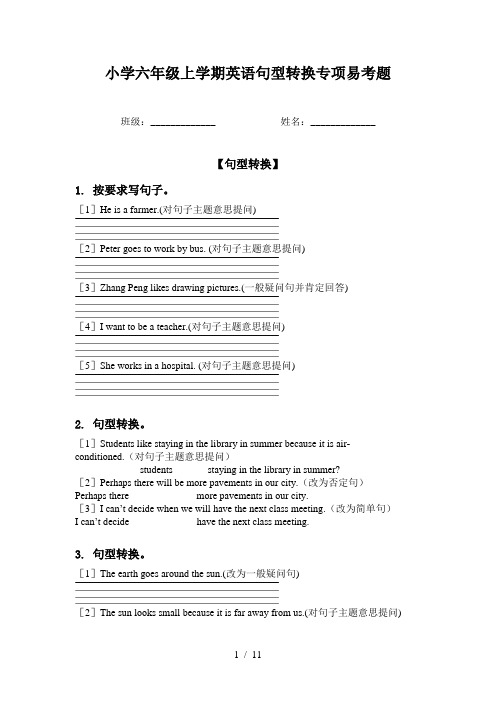
小学六年级上学期英语句型转换专项易考题班级:_____________ 姓名:_____________【句型转换】1. 按要求写句子。
[1]He is a farmer.(对句子主题意思提问)[2]Peter goes to work by bus. (对句子主题意思提问)[3]Zhang Peng likes drawing pictures.(一般疑问句并肯定回答)[4]I want to be a teacher.(对句子主题意思提问)[5]She works in a hospital. (对句子主题意思提问)2. 句型转换。
[1]Students like staying in the library in summer because it is air-conditioned.(对句子主题意思提问)______ ______ students ______ staying in the library in summer?[2]Perhaps there will be more pavements in our city.(改为否定句)Perhaps there ______ ______ more pavements in our city.[3]I can’t decide when we will have the next class meeting.(改为简单句)I can’t decide ______ ______ have the next class meeting.3. 句型转换。
[1]The earth goes around the sun.(改为一般疑问句)[2]The sun looks small because it is far away from us.(对句子主题意思提问)[3]Does the moon shine? (作否定回答)[4]Is there a bed in the room? (改为陈述句)[5]He often plays basketball.(改为一般疑问句)[6]Do you want orange juice or milk?(作出回答)4. 按要求完成句子。
六年级上册英语试题--期末基础知识复习--句型练习 人教PEP版(含答案)
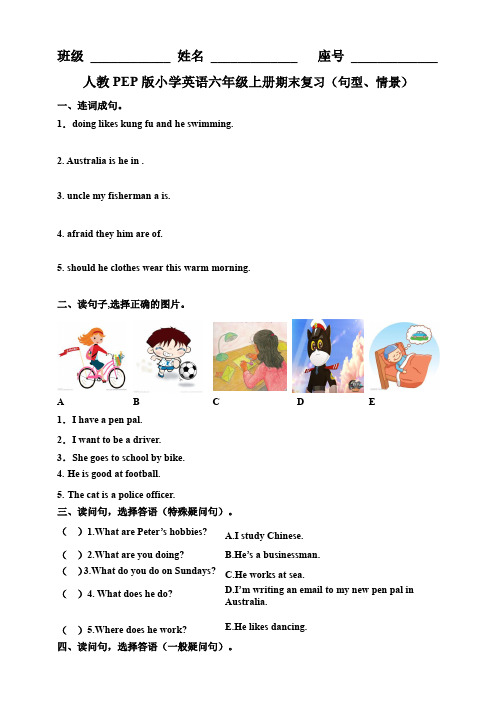
班级 ____________ 姓名 _____________ 座号 _____________人教PEP 版小学英语六年级上册期末复习(句型、情景)一、连词成句。
1.doing likes kung fu and he swimming.2. Australia is he in .3. uncle my fisherman a is.4. afraid they him are of.5. should he clothes wear this warm morning.二、读句子,选择正确的图片。
ABCDE三、读问句,选择答语(特殊疑问句)。
四、读问句,选择答语(一般疑问句)。
1.I have a pen pal. 2.I want to be a driver. 3.She goes to school by bike. 4. He is good at football. 5. The cat is a police officer.( )1.What are Peter’s hobbies? A.I study Chinese. ( )2.What are you doing?B.He’s a businessman.( )3.What do you do on Sundays? C.He works at sea. ( )4. What does he do?D.I’m writing an email to my new pen pal in Australia.( )5.Where does he work?E.He likes dancing.()1. Do you want to be a head teacher, too? A.No, he isn’t. ()2. Is your father here today? B.No, he doesn’t.()3. Does he like doing word puzzles and going hiking? C.Cool!()4.Shall we dance? D.No, I don’t. ()5.Can I also be his pen pal? E.Sure. Why not?五、按照要求完成句子(对划线部分提问)。
小学六年级人教版英语上册句型转换专题练习题

小学六年级人教版英语上册句型转换专题练习题班级:_____________ 姓名:_____________【句型转换】1. 句型转换。
1. I went to Beijing (对句子主题意思提问)_______ did you______?2. I could go cycling before(改为否定句)I _______ _______ cycling before.3. There are some new leaves on the trees. (改为一般疑问句)_______ there ______ new leaves on the trees?4. Jack’s father is 90 kilograms.(对句子主题意思提问)_______ ______ is Jack’s father?5. Mike is 1.5m tall. John is 1.4m tall (用than 合为一句话)Mike is ______ ______ John.2. 句式转换。
1.Is Mary reading book? (做否定回答)______, she ______.2.We went to the library yesterday.(用 next week改写)We w______ ______ to the library next week.3. 句型转换。
[1]It will rain tomorrow.( 改为一般疑问句)_____ _____ rain tomorrow?[2]They are going to the zoo next Sunday. (主题意思提问)______ ______ they ______ _____ the zoo?[3]I saw many animals in Beijing Zoo. (主题意思提问)_____ _______ _______ _____ ______ _______ in Beijing Zoo?[4]Uncle Peter lives in Australia. (对句子主题意思提问)__________ __________ Uncle Peter __________?[5]He is going to read some books about animals this afternoon.(用sometimes改写)。
小学六年级人教PEP版英语上册句型转换专题练习题

小学六年级人教PEP版英语上册句型转换专题练习题班级:_____________ 姓名:_____________【句型转换】1. 按要求写句子。
[1]He ate a cake last Sunday.(用every day替换last Sunday)He _____a cake every day.[2]Helen watched TV last night.(对句子主题意思提问)_________ ________Helen ____________last night?[3]I caught some fish there yesterday.(改为一般疑问句)______you____ ___fish there yesterday?[4]It was interesting.(改为否定句)It________ interesting.[5]too, does, on, she, shopping, the, Internet (.)(连词成句)2. 根据要求写句子。
1. My mother can sing well. (改为一般疑问句)2. We’re going on a trip. (翻译成汉语)3. He can’t play basketball. (改为肯定句)4. 这是四月。
(翻译成英语)5. Children get colourful Easter eggs. (主语改成单数)3. 句型转换。
1.How are you?(回答“好”)2.Did you go to bed last night?(做肯定回答)4. 按要求改写句子。
[1]My uncle walks to the supermarket.(用be going to结构改写句子) My uncle ______ ______ ______ ______ to the supermarket.[2]We are going to visit the Great Wall next Saturday.(改为否定句) We ______ ______ to visit the Great Wall next Saturday.[3]Linda is going to dance at Mike’s party.(对句子主题意思提问)______ ______ Linda ______ ______ ______ at Mike’s party?[4]We’re going to have a party at five.(对句子主题意思提问)______ ______ you ______ ______ have a party?[5]He is going to go fishing.(改为一般疑问句)______ he ______ ______ go fishing?5. 句型转换。
小学英语六年级专项练习-句型练习
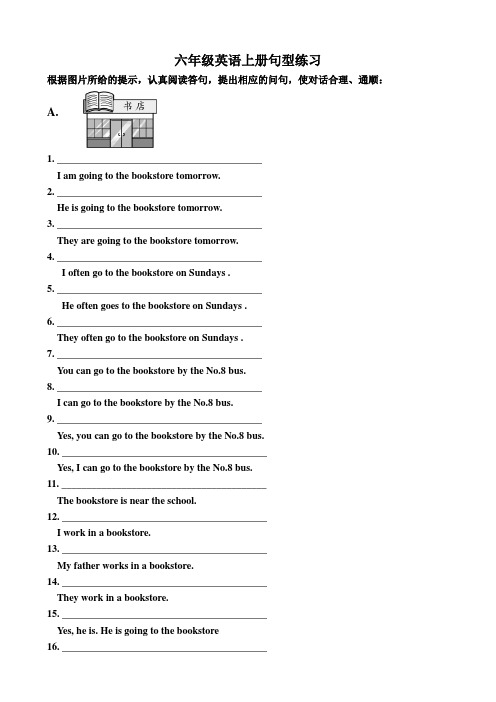
六年级英语上册句型练习根据图片所给的提示,认真阅读答句,提出相应的问句,使对话合理、通顺:A.1. _________________________________________I am going to the bookstore tomorrow.2. _________________________________________He is going to the bookstore tomorrow.3. _________________________________________They are going to the bookstore tomorrow.4. _________________________________________I often go to the bookstore on Sundays .5. _________________________________________He often goes to the bookstore on Sundays .6. _________________________________________They often go to the bookstore on Sundays .7. _________________________________________You can go to the bookstore by the No.8 bus.8. _________________________________________I can go to the bookstore by the No.8 bus.9. _________________________________________Yes, you can go to the bookstore by the No.8 bus.10. _________________________________________Yes, I can go to the bookstore by the No.8 bus.11. _________________________________________The bookstore is near the school.12. _________________________________________I work in a bookstore.13. _________________________________________My father works in a bookstore.14. _________________________________________They work in a bookstore.15. _________________________________________Yes, he is. He is going to the bookstore16. _________________________________________No, he works in a school.17. _________________________________________No, he doesn’t. He works in a school.18. _________________________________________No, he doesn’t work in a school.B.1. _________________________________________I go to school on foot.2. _________________________________________Tom goes to school on foot.3. _________________________________________Tom and Lily go to school on foot.4. _________________________________________I am going to school on foot tomorrow.5. _________________________________________Tom is going to school on foot tomorrow.6. _________________________________________They are going to school on foot tomorrow.C.1. _________________________________________She’s my aunt.2. _________________________________________She’s a singer.3. _________________________________________She’s singing.4. _________________________________________ She can sing.5. _________________________________________She often sings on the weekend.6. _________________________________________ She likes singing.7. _________________________________________ I’m going to be a singer.8. _________________________________________ She is going to be a singer.9. ____________________________________ I can sing.10. ____________________________________ I’m singing.11. ____________________________________ I often sing on the weekend.12. ____________________________________ I like singing.13. _____________________________________ I am a singer.14. _____________________________________ Yes , I’m singing.15. _____________________________________ Yes, I do. I like singing.D.1. _________________________________________There are 4 traffic lights.2. _________________________________________We can go at a green light.3. _________________________________________You can’t stop at a green light.4. _________________________________________No, you can’t stop at a green light.5. _________________________________________No, you can’t . You can go at a green light.E.1. _________________________________________ I can make kites.2. _________________________________________ I am making kites.3. _________________________________________ I am going to make kites.4. _________________________________________ I often make kites on Sundays...5. _________________________________________ He can make kites.6. _________________________________________ He is making kites.7. _________________________________________ He is going to make kites.8. _________________________________________ He usually makes kites on Sundays..9. _________________________________________ I like making kites.10. _________________________________________ Tom likes making kites.11. _________________________________________ My brother likes making kites.F.1. _________________________________________ It’s a comic book.2. _________________________________________ The comic book is 10 yuan.3. _________________________________________ I like reading comic books4. _________________________________________ I often read comic books on Sundays.5. _______________________________________ He often reads comic books on Sundays.6. _________________________________________ I am reading comic books .7. _________________________________________ He is reading comic books .8. ________________________________________ I am going to read comic books tonight.9. ________________________________________ He is going to read comic books tonight.10. _________________________________________ He usually makes kites on Sundays.G.1. _________________________________________ You can turn right here.2. _________________________________________ No, you can turn right here.3. _________________________________________ Yes, I can turn right here .4. _________________________________________ Amy can turn right here.5. _________________________________________ Yes, I am going to turn right here .6. _________________________________________ No, you mustn’t turn left here .。
六年级英语句型转换练习题及答案

精品文档六年级英语句型转换练习题及答案一、句型转换:1. The apples are five yuan.2.. My mum cleans the room every day.对画线部分提问)对画线部分提问)对画线部分提问)对画线部分提问二、按要求写句子。
1. There are some art rooms in this building. There _____ _____ art room in this building.2. Give that sharpener to me.5. ________________________________________6. We can see some kites in the sky._____________________________________二、把以下句子改成一般疑问句和否定句例: They are running.一般疑问句: Are they running?否定句: They are not running.1. She is good at music.2. He likes eating cakes.3. You are playing basketball.1 / 10精品文档4. I am good at playing football.5. She goes to school every day.6. The lion is sleeping.7. The small monkey likes climbing trees.8. They watch TV every Sunday.按要求改写下列句子。
1. He does well in Maths.2. Mike runs as fast as Ben.3. I get up at six thirty every day.4. Jim is reading English.5. Liu Tao usually reads newspaper.6. They are from Australia.7. It is thirty yuan..8. Turn right at the third crossing.9. I go to the shopping centre by bus.10. The computer is Peter’s.三.把下列句子改为否定句。
小学英语六年级上册重要句型练习

小学英语六年级上册重要句型练习1、通常我步行来,有时我乘公共汽车.2、通常我乘火车来,有时我乘轮船来.ip .3、黄灯时减速并停下来Slow down and stop at a yellow light .4、红灯时停并等候.5、绿灯行.6、通常他开车去,有时他乘出租车去.Usually he goes by car . Sometimes he goes by taxi .7、通常她步行去公园,有时她骑自行车去. Usually she goes to the park on foot . Sometimes she goes by bike .8、下周我打算去公园,我打算打乒乓球.I’m going to the park next week . I’m going to play ping-pong .9、今晚我打算去电影院,我打算看一场电影.I’m going to the cinema tonight . I’m going to see a film .10、明天我打算去书店,我将在那里读书.I’m going to the bookstore tomorrow . I’m going to read books .11、明天我打算去超市.我将买一支钢笔.I’m going to the suoermarket tomorrow . I’m going to buy a pen .12、我喜欢练武术,我妈妈喜欢跑步.I like doing kung fu . My mother likes running .13、我喜欢唱歌,我妹妹喜欢跳舞.I like singing . My sister likes dancing .14、我喜欢学汉语,我哥哥喜欢学英语.I like studying Chinese . My brother likes English .15、John喜欢猜字谜.Mike 喜欢去远足.John likes doing word puzzles . Mike likes going hiking .16、我的姑姑是一名科学家,她在大学里工作.My aunt is a scientist . She works at a university .17、我的父亲是一名渔民,他在大海上工作.My father is a fisherman . He works at sea .18、我的叔叔是一名教练,他在体育馆里工作.My uncle is a coach . He works in a gym . 19、他在船上工作,他骑自行车去上班.20、Sarah生气了,猫很害怕.Sarah is angry . The cat is afraid .21、猫生病了,Sarah 很难过.22、Sarah和猫很担心.Sarah and the cat are worried .23、他们很高兴.They are happy .24、你应该去看医生You should see a doctor .5、你应该深深吸一口气,数到十。
小学英语六年级语法专项练习:一般将来时
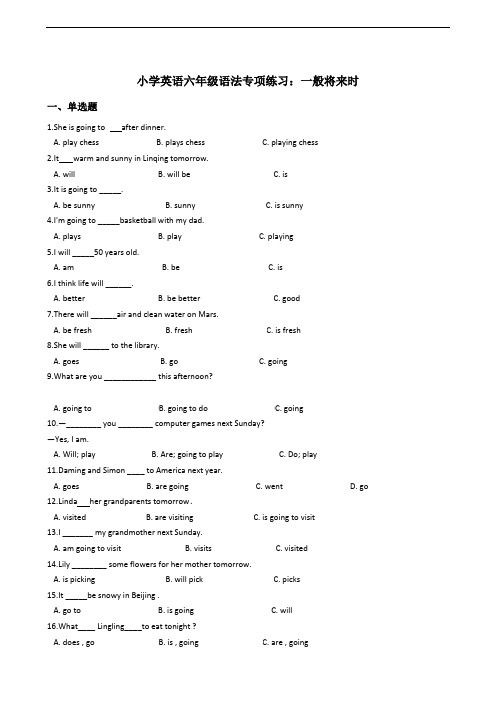
小学英语六年级语法专项练习:一般将来时一、单选题1.She is going to after dinner.A. play chessB. plays chessC. playing chess2.It warm and sunny in Linqing tomorrow.A. willB. will beC. is3.It is going to _____.A. be sunnyB. sunnyC. is sunny4.I'm going to _____basketball with my dad.A. playsB. playC. playing5.I will _____50 years old.A. amB. beC. is6.I think life will ______.A. betterB. be betterC. good7.There will ______air and clean water on Mars.A. be freshB. freshC. is fresh8.She will ______ to the library.A. goesB. goC. going9.What are you ____________ this afternoon?A. going toB. going to doC. going10.—________ you ________ computer games next Sunday?—Yes, I am.A. Will; playB. Are; going to playC. Do; play11.Daming and Simon ____ to America next year.A. goesB. are goingC. wentD. go12.Linda her grandparents tomorrow.A. visitedB. are visitingC. is going to visit13.I _______ my grandmother next Sunday.A. am going to visitB. visitsC. visited14.Lily ________ some flowers for her mother tomorrow.A. is pickingB. will pickC. picks15.It _____be snowy in Beijing .A. go toB. is goingC. will16.What____ Lingling____to eat tonight ?A. does , goB. is , goingC. are , going17.Where are we ______?A. goB. goesC. going18.—What are you going to do this afternoon?—A. I'm going to play basketball.B. I'm a student.C. I'm doing homework.19.Miss Li ________to Beijing for a meeting next Monday.A. wentB. goesC. will go20.We ________ a Christmas card ________ our good friend tomorrow.A. send; forB. write; toC. are going to write; to21.— What ______ you going to do?— I _____ going to dance with the music.A. is, amB. are, isC. are, am22.— ______ he going to visit his uncle next week?—Yes, he will.A. DoesB. IsC. Will二、判断题23.David is going to buy his favourite comic book.24.I will be a doctor. (判断语句是否正确)25.Will you a math teacher? (判断语句是否正确)26.What will you do to Mom?27.I'll give her a card.28.Are you going home?29.We'll thirsty.30.What are you going to took with you?三、填空题31.—What________you________(do) tomorrow, Lily?32.—I'll________(see) a film in the morning. Then I'll________(play) football in the afternoon.33.________(be) there many trees in this forest in the past?34.—Yes, there________(be). But now there________(be) not many trees.35.—________people________(plant) more trees in the future?—I don't know.36.They are going to________ ( stay ) in Beijing.37.Jing ________( go to ) the Great Wall tomorrow.38.My friend ________ the play yesterday. I ________ it tomorrow. (see)39.They ________(plant) trees tomorrow.40.I ________(fly)kites tomorrow .41.I'm going to ________(visit)Beijing .42.How long will we________(stay)in Sanya?43.He ________ (fly) a kite with his friends tomorrow.四、语法填空41.阅读短文, 用所给词的正确形式填空Hi, I am Simon. I________ (write) a letter to my cousin, Daming now. I________ (come) from the US. But Daming is from China. He often ________ (tell) me lots of funny things about China. And I like ________ (read) books about China, too. There________ (be) lots of delicious food and beautiful places in china. I want________ (go) to China. So last year I ________ (go) to China and ________ (visit) many beautiful places in China. I was very happy. Daming asks me ________ (meet) him in China again. So I ________ (go) to China next year again.五、句型转换42.They are going to have a birthday party this weekend. (改为同义句)They ________ ________a birthday party this weekend.43.I'm going to read books this evening. (改为一般疑问句并做否定回答)________ you________ ________read books this evening?No, ________ ________.44.They are playing football now. (用tomorrow替换now)They________ ________ football tomorrow.45.I'll cook fish. (改为一般疑问句)________ you ________ fish?46.I will go fishing this weekend. (改为否定句)I________ ________ ________fishing this weekend.47.We will go to the supermarket this aftermoon.(把this afternoon改为every afternoon)We ________ ________ the supermarket every afternoon.48.Mike is going to take a gift tomorrow. (对划线部分提问)________ is Mike going to ________ tomorrow?49.My mother told me a story yesterday? (用be going to改写句子)My mother ________going to ________ me a story.六、翻译50.迈克将会回伦敦。
小学六年级英语句型专项练习

句型专项练习一、用be动词“am,is,are”填空1、I ________ Tony.2、She ______ his mother.3、He ______ my brother.4、It _______ a key.5、How _______ you?6、You ______ a student.(学生)7、I _______ her sister.8、She ______ my cousin.9、He _______ my grandfather. 10、It_______ an orange.11、What _______ your first name? 12、These _______ my photos.二、根据问句作肯定回答或否定回答.1.Is Sarah happy today?(作肯定回答)2.Are your friends having a picnic? (作否定回答)3.Do you watch TV in the evening? (作肯定回答)4.Does Miss Wu teach you English?(作否定回答)5.Can they play the piano? (作肯定回答)三、把下列句子改为一般疑问句。
1.He goes to school on foot.2.Mrs. Li and Kitty were here just now.3.There was a building here last year.4.I will look after my sister this Sunday.5.Tom did his homework last night.6.Mike has a dog.7.I like apples.8.She likes apples.四、对画线部分提问.1. They bought a new bike yesterday.2. She is a nurse .3. She is my teacher.4. It is my coat .5. I am looking for my sister .6. I get up at six .7. I am from Hubei .8. It is windy .9. My bag is red .10. The book is Li Hua’s .11. I like math best.12. They are five yuan .五、选择题1.Excuse me , is the nearest bookshop?A.howB.whatC.whereD.who2. are you going??-I'm going to the library.A.WhoB.WhichC.WhatD.Where3、It 's a nice car. have you been in it?A.How muchB.How soonC.How longD.How far4、 ? I'm eight.A.What day is itB.What's five and threeC.How old are youD.What's your telephone number。
小学六年级上学期英语句型转换复习专项题

小学六年级上学期英语句型转换复习专项题班级:_____________ 姓名:_____________【句型转换】1. 根据要求完成句子。
1. Tombs / in / also / the / Ming / the / of / north / is / Beijing (.) ( 连词成句 )2. I hear the lake is very beautiful. (改为否定句)3. Jeff is telling us where we are going to visit. ( 改为一般疑问句 )4. Lynn is going to travel with her parents in Hangzhou. ( 对句子主题意思提问 )5. We are going to visit the interesting place. ( 改为否定句 )2. 按要求改写句子。
1. Tim saw some interesting parrots in the park. (改为否定句)Tim___________ ____________ _____________interesting parrots in the park.2. His father caught a big fish last night.(改为一般疑问句)_______________his father________a big fish last night?3.It’s cloudy today.(对句子主题意思提问)_________the____________ today?4.They visited Taipei last Friday.(用tomorrow改写句子)They ________________ __________________Taipei tomorrow.5.Will Nancy visit her aunt and uncle next week?(作否定回答)No. she_____________.3. 对句子主题意思提问。
小学六年级英语复习资料句型及练习

陈述句 (一)陈述句的肯定式 陈述句的肯定式有以下两种形式: 1.主语+系动词+表语 2.主语+谓语+其他成分 (二)陈述句的否定式 陈述句的否定式有以下四种形式: 1.谓语动词是be 动词时,由“be+not ”否定形式。
2.词时,由“do /does/did+not ”构成否定形式。
3.谓语为“助动词/情态动词+实义动词”时,由“助动词/情态动词+not ”构成否定形式。
4.有些陈述句的否定式是用no ,nothing ,nobody 等表示否定意义的词构成的。
Nobody is in.没有人在家里。
疑问句 (一)一般疑问句 1.一般疑问句的肯定式 一般疑问句可以用肯定词yes 或否定词no 回答,朗读一般疑问句时用升调。
根据其谓语动词的区别,一般疑问句的肯定式有两种。
(1)谓语动词为be ,have ,助动词或情态动词时,一般疑问句中把谓语动词be ,have ,助动词或情态动词提到句子开头。
(2)谓语动词为实义动词时,一般疑问句的形式为“do /does/did+主语+动词原形”。
特殊疑问句是对句子中某一部分提问的疑问句。
常用疑问词what,who,whose,which,when,why,where,ho w 等引导。
特殊疑问句不用yes 或no 回答,而是要根据实际情况进行回答。
朗读特殊疑问句时通常用降调。
根据特殊疑问句在句子担当成分的不同,特殊疑问句的结构形式可分为两种。
1.一般情况下,特殊疑问句由“疑问词+一般疑问句”构成。
What do you do at home?你在家做什么?Which color do you like?你喜欢哪种颜色?2.疑问句作主语或主语的定语时,特殊疑问句词序与陈述句相同。
Who cooks meals in your home?你家里祈使句 一、祈使句的定义 祈使句是用来表示请求、命令、劝告、建议等的句子。
祈使句习惯上常常省略主语(以动词开头的句子),句末用感叹号或句号,朗读时一般用降调。
六年级英语常用句型应用练习题及答案

六年级英语常用句型应用练习题及答案[标题]六年级英语常用句型应用练习题及答案[引言]英语作为一门重要的国际语言,在学生的学习过程中具有重要的地位。
六年级学生正处于英语学习的关键阶段,熟练掌握常用句型对于他们的英语表达能力以及语法应用水平有着重要的影响。
本文将提供一系列六年级英语常用句型的应用练习题,帮助学生在实践中巩固所学内容。
[正文]练习题一:用适当的句型完成下列英语句子。
1. ______ you ______ a red pencil?2. ______ does the school library close?3. I can ______ but I can't ______.4. He ______ ______ in the river yesterday.5. How many ______ ______ in the zoo?6. Would you like ______ ______ a movie with me?答案:1. Do; have2. When3. swim; skate4. went; swimming5. monkeys are there6. to watch练习题二:将下列英语句子变成否定句。
1. I have a dog.2. She is playing tennis now.3. We can swim in the river.4. They were watching a movie.答案:1. I don't have a dog.2. She isn't playing tennis now.3. We can't swim in the river.4. They weren't watching a movie.练习题三:根据所给的情景,用合适的句型进行回答。
1. 你想知道别人的年龄,应该如何问?2. 当你想和同学一起做作业时,应该怎么说?3. 当你想知道今天是否有篮球比赛时,应该问什么?答案:1. How old are you?2. Can I do homework with you?3. Is there a basketball game today?练习题四:根据图片的内容,选择正确的句型进行描述。
小学六年级英语下册《常考句型习题》带答案

《常考句型习题》带答案归纳
一、选择合适的单词填空。
1. I am lookingoutof the window.
2. Shenzhou V flewintospace.
3. What are you goingtostudy?
4. The apples are fallingive Tom this book. (写出同义句)
PleasegivethisbooktoTom.
5. My father bought a model plane for me yesterday. (改为一般疑问句)
Didyour fatherbuya model plane foryouyesterday?
4. Yesterday she flewto the UK.
5. Shenzhou V took a Chinese into space for the first time.
6. You are a wonderfulfriend.
7. Six years ago, he spoke only very littleEnglish.
2. loudly,are,why,you,laughing(?)
Why are you laughing loudly?
3. study, what, you, going, to, are(?)
What are you going to study?
4. was,in,she,born,1880,in,America(. )
My mother has got a new watch,but she never wears it.
3. I bought a new book. I liked reading it very much.
小学六年级英语短语专项练习题

小学六年级英语短语专项练习题第一部分:选择题(10分)1. -- Where is the nearest supermarket?-- It's __________ the corner of the street.A. inB. onC. atD. to2. -- Could you please pass me the salt?-- Sure, here you __________.A. areB. doC. haveD. would3. -- How do you usually go to school?-- I often walk, but sometimes I go __________ bike.A. onB. inC. byD. with4. -- What are you doing this weekend?-- I'm going __________ a camping trip with my family. A. in B. on C. at D. to5. -- What's __________ the desk?-- There's a book, a pen, and a notebook.A. underB. withC. inD. on6. -- I'm thirsty. Is there any juice __________?-- Yes, there's some in the fridge.A. atB. inC. onD. with7. -- Could you please help me __________ my math homework? -- Of course! I'd be happy to help.A. atB. withC. inD. on8. -- What's the matter __________ you?-- I have a headache.A. withB. atC. onD. in9. -- My birthday is __________ November 11th.-- That's great! Mine is __________ November too.A. on, onB. in, inC. on, inD. in, on10. -- Excuse me, how can I get __________ the library?-- Go straight and turn left at the second intersection.A. forB. toC. inD. at第二部分:填空题(10分)1. My mother is good __________ cooking.2. My brother is interested __________ playing basketball.3. We usually go to school __________ bus.4. The supermarket is __________ the right.5. Sarah is very kind. She often helps others __________ need.6. There are many books __________ the bookshelf.7. The cat is __________ the chair.8. The teacher is __________ the front of the classroom.9. My sister is afraid __________ dogs.10. We need to be careful __________ the road.第三部分:句子翻译题(10分)1. 她经常和朋友们一起出去玩。
小学六年级沪教版英语上册句型转换专题练习题

小学六年级沪教版英语上册句型转换专题练习题班级:_____________ 姓名:_____________【句型转换】1. 按要求写句子。
[1]We shouldn’t waste water.(改为同义句)We _____ _____ water.[2]We use wood to make tables.(对句子主题意思提问)_____ _____we use to make tables?[3]Wood comes from trees.(改为一般疑问句)_____ wood _____ from trees?[4]much, many, is, places, not, water, in, there (.)(连词成句)[5]plastic, don’t, much, use, too (.)(连词成句)2. 按要求写句子。
[1]I''ve got a kite from China.(改为否定句)[2]I''ve got a pen friend.(改为一般疑问句)[3]Have you got some books?(做否定回答)[4]I can fly a kite.(就主题意思提问)[5]It''s Daming''s book.(就主题意思提问)3. 读一读, 按要求改写句子。
[1]I go to school by subway.(对句子主题意思提问)___ _____ _____go to school?[2]My home is near here.(改为同义句)My home is ____ ____from here.[3]I often go to school by bike.(改为一般疑问句)___ you often go to school by bike?[4]There are five cinemas in this city.(对句子主题意思提问) ___ _____cinemas are there in this city?[5]I usually go to the post office on foot.(改为同义句)I usually _____to the post office.4. 根据要求完成句子。
- 1、下载文档前请自行甄别文档内容的完整性,平台不提供额外的编辑、内容补充、找答案等附加服务。
- 2、"仅部分预览"的文档,不可在线预览部分如存在完整性等问题,可反馈申请退款(可完整预览的文档不适用该条件!)。
- 3、如文档侵犯您的权益,请联系客服反馈,我们会尽快为您处理(人工客服工作时间:9:00-18:30)。
6B 句型总复习(1) Name___________一般现在时:句子中常有often, usually, always, sometimes, every day,on Sundays 等词,表示一般的情况。
例:1. I often go to school at half past six .Do you go to school at half past six? Yes, I do. No,I don’t.2. He usually does his homework in the evening.Does he usually do his homework in the evening?Yes, he does. No, he doesn’t3. Mary flies kites on Sundays.Does Mary fly kites on Sundays?Yes, she does. No, she doesn’t.练习 1,我们经常在夏天游泳。
翻译________________________________________________问题_______________________________________________________ 2,他每天打扫教室。
翻译_______________________________________________问题_____________________________________________________3,本经常在晚上看电视。
翻译_____________________________________________问题_____________________________________________________般现在时用法专练一、用括号内动词的适当形式填空。
1. He often (have) dinner at home.2. Daniel and Tommy (be) in Class One.3. We (not watch) TV on Monday.4. Nick (not go) to the zoo on Sunday.5. they (like) the World Cup?6. What they often (do) on Saturdays?7. your parents (read) newspapers every day?8. The girl (teach) us English on Sundays.9. She and I (take) a walk together every evening.10. There (be) some water in the bottle.11. Mike (like) cooking.12. They (have) the same hobby.13. My aunt (look) after her baby carefully.14. You always (do) your homework well.15. I (be) ill. I’m staying in bed.16. She (go) to school from Monday to Friday.17. Liu Tao (do) not like PE.18. The child often (watch) TV in the evening.19. Su Hai and Su Yang (have) eight lessons this term.20. -What day (be) it today?- It’s Saturday.二、按照要求改写句子1. Daniel watches TV every evening.(改为否定句)2. I do my homework every day.(改为一般疑问句,作否定回答)3. She likes milk.(改为一般疑问句,作肯定回答)4. Amy likes playing computer games.(改为一般疑问句,作否定回答)5. We go to school every morning.(改为否定句)6. He speaks English very well.(改为否定句)7. I like taking photos in the park.(对划线部分提问)8. John comes from Canada.(对划线部分提问)9. She is always a good student.(改为一般疑问句,作否定回答)10. Simon and Daniel like going skating.(改为否定句)三、翻译1.他在第三小学上学。
他每天早上七点上学。
(No. 3 Primary School)2.父亲每天早晨都浇花。
3.我女儿喜欢看电视和听音乐。
4.桑迪放学后打羽毛球吗?不。
她学习很用功。
放学后她总是看书。
四、改错( )1. Is your brother speak English?A BC( )2. Does he likes going fishing?A BC( )3. He likes play games after class.A BC( )4. Mr. Wu teachs us English.AB C( )5. She don’t do her homework on Sundays.ABC6B 句型总复习(2)Name_________现在进行时:句子中有now, 动词加ing 表示现在正在做的事。
例:1. I am doing my homework.Are you doing your homework? Yes, I am. No, I am not.2. She is washing her face.Is she washing her face? Yes, she is. No, she isn’t.3.The girls are dancing now.Are the girls dancing now? Yes, they are. No, they aren’t.练习:1,我正在写一封信。
翻译____________________________________________问题_____________________________________________2,他们正在上英语课。
翻译___________________________________________问题___________________________________________________3,她正坐在我旁边。
翻译__________________________________________问题_______________________________________________6B 句型总复习(3)Name________一般过去式:句子中常有yesterday, last week, last month ,just now,a moment ago, 等表示过去时间的词,表示已经做过的事。
例:1. We visited a farm last week.Did you visit a farm last week? Yes, we did. No, we didn’t.2. That book was on the desk just now.Was the book on the desk just now? Yes, it was. No, it wasn’t3. Nancy went to Wuxi last year.Did Nancy go to Wuxi last year? Yes, she did. No, she didn’t.练习: 1.我昨天打了篮球。
翻译______________________________________________问题__________________________________________________________2.他们上个月去了第一中学。
翻译____________________________________________问题________________________________________________3.汤姆上个星期日看了卡通片。
翻译___________________________________________问题_________________________________________________4.吉姆去年比我高。
翻译___________________________________________问题_________________________________________________6B 句型总复习(4)Name________一般将来式:句子中常有表示将来时间的词组,tomorrow, next week, next month, 等。
表示将要做或者准备要做的事。
用be going to do 的句式例:1. We are going to plat trees next week.Are you going to plant trees next week? Yes, we are. No, we aren’t.2. I am going to see a play tomorrow.Are you going to see a play tomorrow? Yes, I am. No, I am not.3. She is going to make snowmen.Is she going to make snowmen? Yes, she is. No, she isn’t.练习: 1.你将变得更强壮。
翻译_________________________________________问题___________________________________________________2.我下星期准备做更多的练习。
翻译__________________________________________问题______________________________________________3.他明天将去参观历史博物馆。
